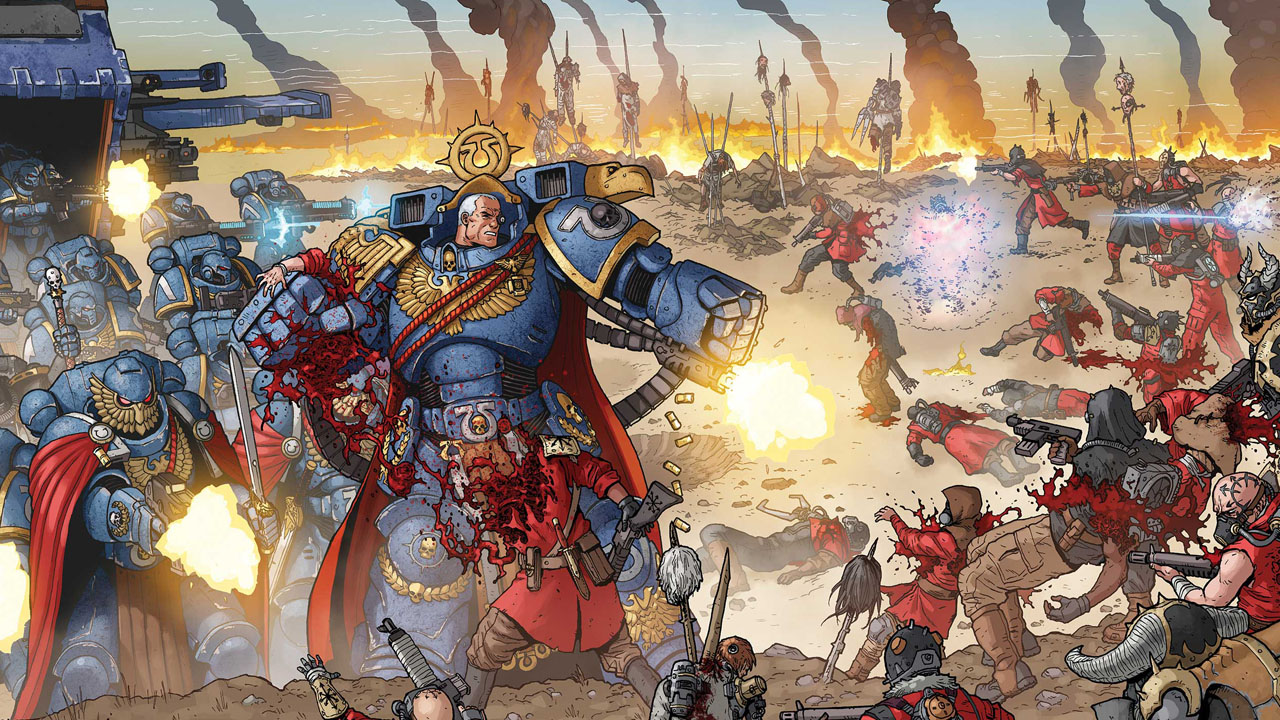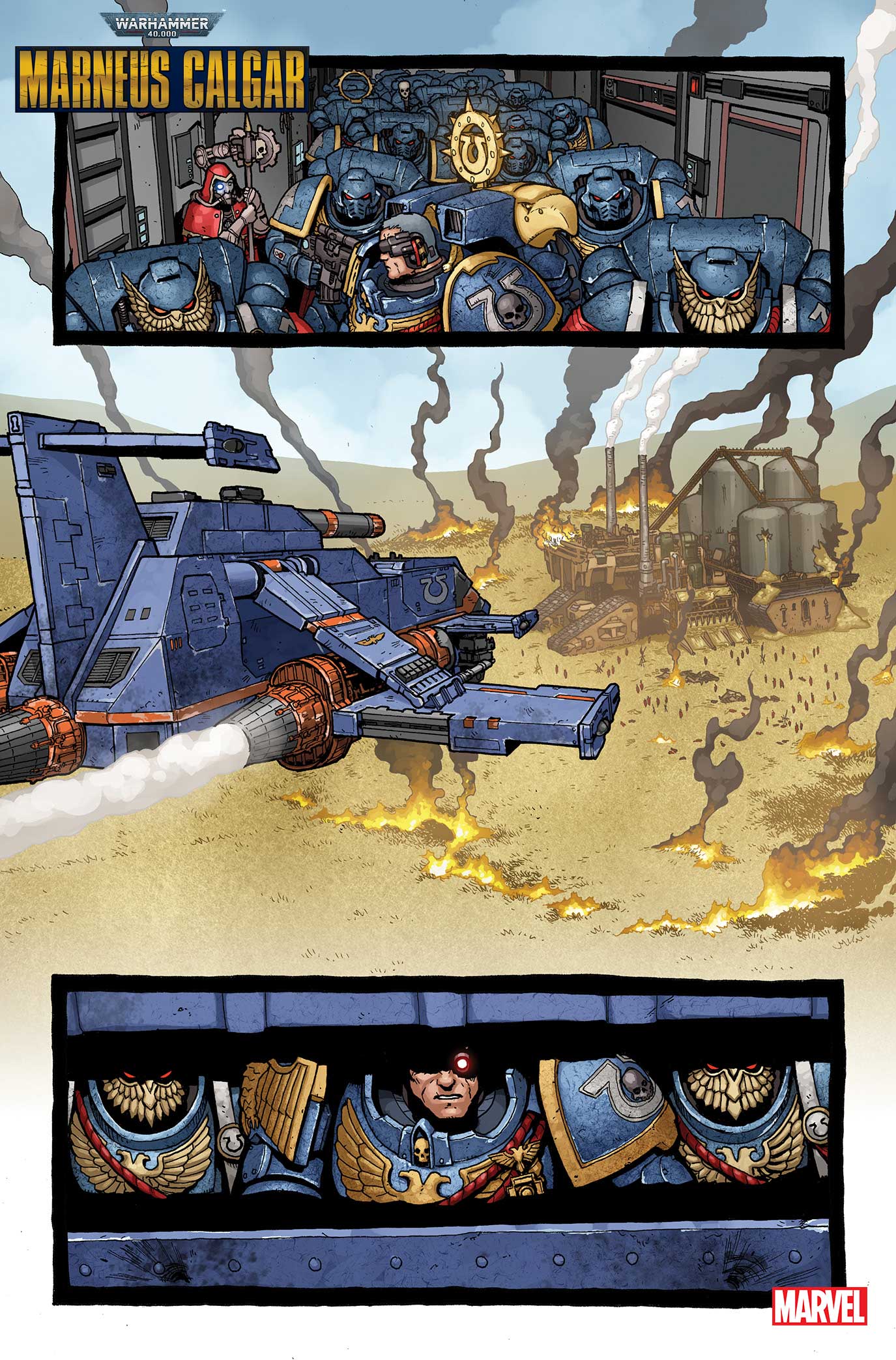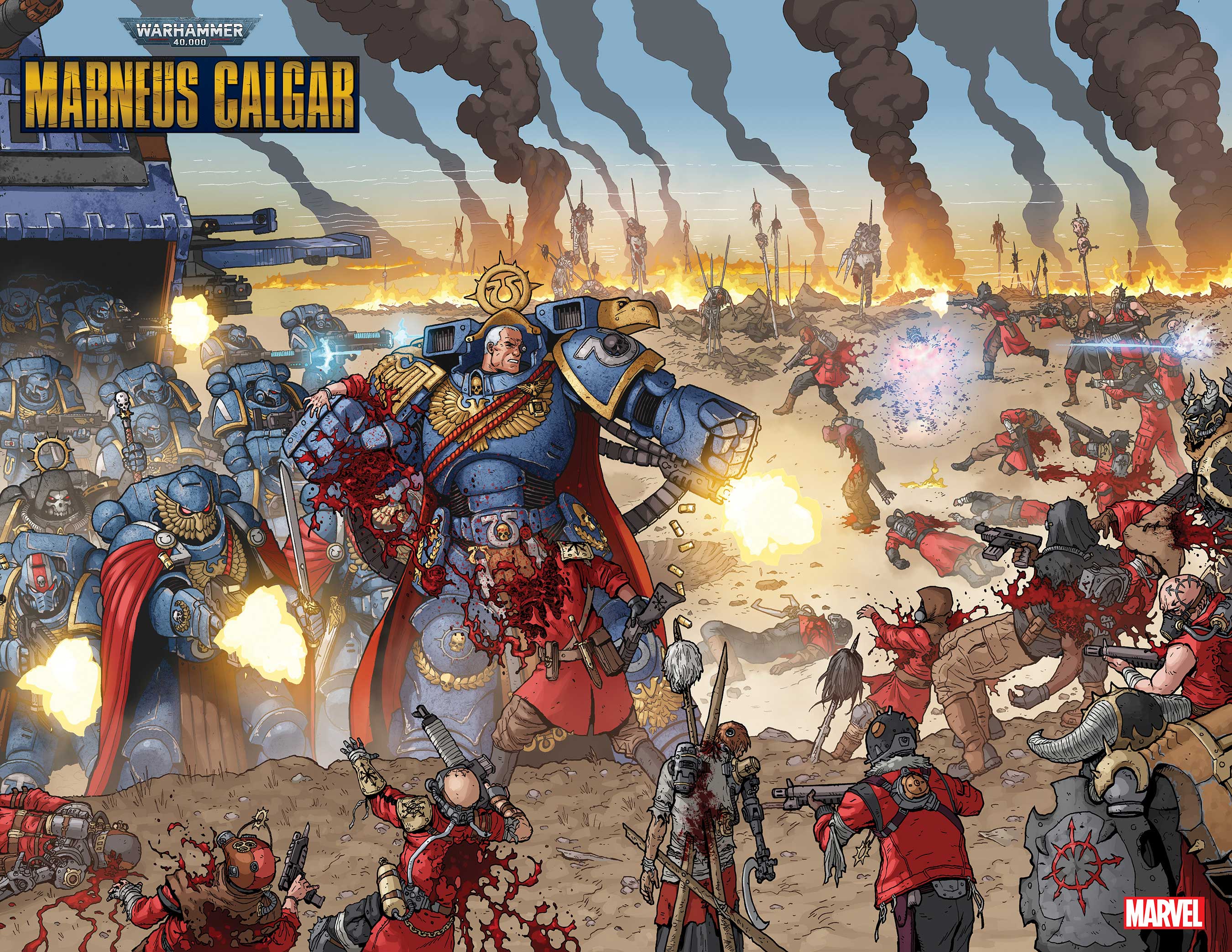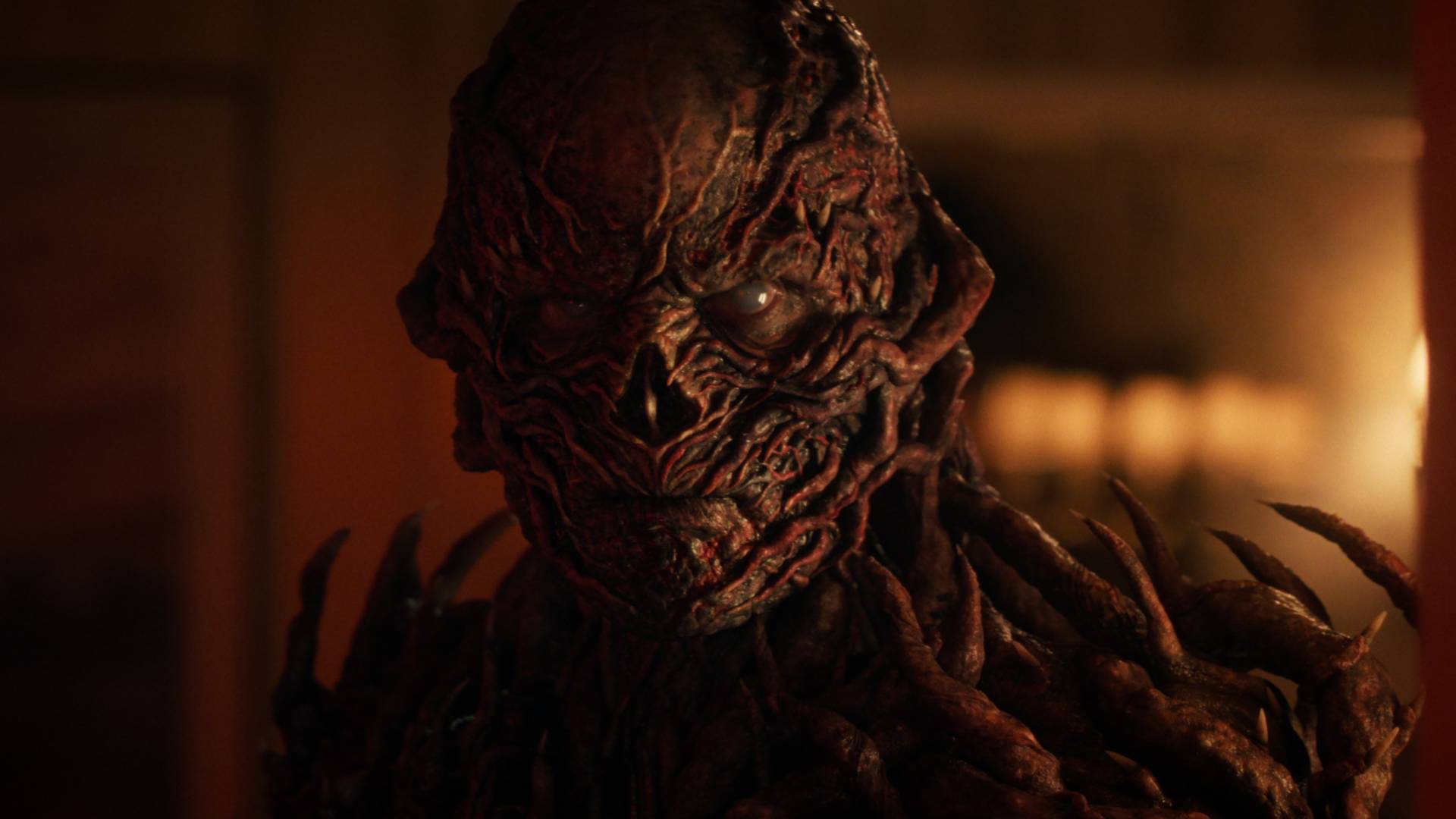Introducing Warhammer 40k to comic readers with Batman: Year One-style take on the iconic Marneus Calgar
Kieron Gillen wants to share his love of Warhammer 40k with the world via his Marneus Calgar origin story

A new kind of grim darkness is coming to the Marvel Universe: Warhammer 40,000, and the long-awaited origin of one of its most popular characters, Marneus Calgar.
Scheduled to debut October 14, the five-issue Warhammer 40,000: Marneus Calgar unleashes war upon comic readers with one of the industry's biggest WH fans, Kieron Gillen. Joining Gillen on this is Punisher artist Jacen Burrows, leveling a new kind of punishment with the introduction of the Space Marines into the proverbial House of Ideas.
This upcoming series follows chapter master Marneus Calgar from his beginnings on Nova Thulium and early involvement in the Black Crusades to his present role as Chapter Master and Protector of Ultramar – home of the Ultramarines.
Newsarama spoke with Kieron Gillen about his current plans for this series, his decades-long background with the franchise as a player and a writer, and how Marvel is a good fit for this epic (and violent) RPG series.
Newsarama: Kieron, you're no stranger to Warhammer 40,000, having played it and even written it early in your comics career. But what is it about Marneus Calgar and the Space Marines that appeals to you?
Kieron Gillen: I want to introduce 40k to people. If you ask someone who is vaguely aware of 40k to think of 40k, they'll likely think of a Space Marine. That's the icon. We have to start with the icon, which means starting with the Ultramarines and Calgar as their paragon. The thing with the Ultramarines is, when it comes to being Marines, they wrote the book. Literally. The book in question being the Codex Astartes.

My model of the book is basically Batman: Year One. It works simultaneously as an introduction to Batman's universe while hitting every single button a Batman fan would like to see. I want to be able to hand the book to my friends who always wanted to know more about this obsession of mine to explain it a little, while also handing it to my gamer friends so they can enjoy the truly gleeful destruction I get to wreck with Power Fists.
Get the best comic news, insights, opinions, analysis and more!
Nrama: As a WH 40k player, which Space Marine chapter do you prefer to play? Or do you typically align yourself with the forces of Chaos and the Xenos? Please note: Certain answers will result in an immediate call to the local inquisitor.
Gillen: Despite Warhammer being part of my life for so long, I managed to go until the early '10s before painting my first space marine. I couldn't quite believe it.
Back when I started, I was mainly an Imperial Guard player – back before they had any tanks, if you want to go back that far. For me, the Imperial Guard just underlined the awfulness of the universe (i.e. we would all last about two seconds before being eaten by a tyranid) and the aspects of the universe I found touching (i.e. Consider the emotional fortitude it’d take to be a normal human to face off against a 20-foot creature made of teeth and gonads.) Humans in hell have always been my thing, aesthetically speaking.
When I got back into painting circa 2003, I collected a Necron army. When I got back into painting again around 2008-2009, I started by playing Fantasy, finally collecting the Skaven horde I've wanted to since I was a teen, before including 40k again, coming in via the Horus Heresy. I painted Sons of Horus, as I've always had a soft spot for the Black Legion in their very earliest canon appearances (where they were basically a burnt-out husk of a chapter, before Abaddon gave them direction).
I finally painted some contemporary Marines with 8th edition, which are an (abstractly) Ultramarine successor chapter based around laundered Emperor's Children gene-seed. They’re called The Chastised.
Nrama: So you have your own homebrew chapter? What's their backstory?
Gillen: I basically see them being watched by Sisters of Battle in case of any sign of Slaaneshi heresy, like an interest in pretty flowers or something. This background mainly comes from me trying to work out my own chapter's colors, hitting Purple & Gold, liking it, and then realizing I'd just re-created the Heresy-era Emperor's Children. I added white shoulders, pads, and helmets to differentiate themselves and to force myself to try to paint white.
This answer is totally far too long.
Nrama: We have 40,000 years. I think you're safe.
Now, some hardcore fans level accusations of the Ultramarines being vanilla. How do you respond to this form of heresy?
Gillen: I would give them the only answer they understand. Exterminatus. The few seconds of horror as their bodies dissolve from my orbital bombardment will give them sufficient time to consider the error of their thinking.
Nrama: That seems an appropriate response.
Gillen: As I said in the first answer, if you want to explain Space Marines, you have to start with them, because what is unusual can only be understood better when you know what is normal.
Once you know the classical austerity of the Ultramarines, the loose cannon berserk nature of Space Wolves or the awful curse of the Blood Angels are more striking. If you enter the world via a more aberrant chapter, you don't realize how awesome it is that they're aberrant.
Nrama: It does seem a natural choice for Marvel's first foray into the grimdark universe of Warhammer 40,000 to focus on the premier forces of the Imperium of Man.
And with this first series, we'll be exploring the origins of the Ultramarine Chapter Master. Is Calgar too good to be true? Might there be some secrets he's hiding in the libraries in Macragge's buried vaults?
Gillen: In a universe of shadows, there is darkness everywhere.
I like many things about Marneus, but it's an interesting mix of the specific and the universal. How did he end up like the way he has… and how have Space Marines ended up the way they did generally. Yeah, it's got an origin backbone, but it’s a dual origin backbone. It’s about how space marines became Space Marines and how Marneus Calgar became a Space Marine.
The story is also in the present day, and about how the events all those centuries ago when Marneus was training echo even now. Well, not now-now. Far future-now. You know what I mean.
Nrama: Of course.
Now, this won't be the first time you've penned a Warhammer-based comic. Obviously, we're shifting from Warhammer Fantasy to 40k – not to mention almost 12 years between the two - but how has the process changed for you (or remained the same) since Crown of Destruction?
Gillen: Actually, it goes back even further than that. My first two work-for-hire sales were back in 2003 when I sold a couple of five-page shorts to Warhammer Monthly. 'Crown of Destruction' was actually my first WFH comic in the American market.
What’s changed? I tend to describe 'Crown of Destruction' as being paid to learn how to write action comics. I'd written Phonogram, which is a fine advertisement that I can write Phonogram stories. 'Crown of Destruction' wasn’t Phonogram. There's no rat-men with flamethrowers that send magical warpfire at their foes in Phonogram. Anyway – 'Crown of Destruction' was fun, and folks seemed to like it but was very much learning dance steps.
Nrama: So, it's time to dance?
Gillen: I've had over a decade of writing action comic now and plan to bring the full skillset to bear on the problem. The aim is to make the best Warhammer comics the world has ever seen. I wouldn't have said yes to the job if I didn't think there was a chance we could pull it off.
So, the difference is that if 'Crown of Destruction' was learning dance steps, this is me trying to audition for a Harlequin troupe. Wish me luck.
Nrama: Well, it's a little more than luck on your side as you'll be working alongside veteran artist Jacen Burrows on this series – your first time collaborating together, no? What has you most excited about his work in this series that readers need to keep an eye out for?
Gillen: Yes! I've known Jacen for years, both having done a bunch of work over at Avatar. We've hung together, and talked previously about doing a comic– something epic, something with fantasy grandeur, something messy, bloody, and metal.
When [Marvel editor] Mark Basso suggested Jacen for the book, it seemed a perfect chance to fulfill that. Clearly this isn't the level of gore that we'd be doing on something at Avatar, but someone who could go there is obviously a boon. He's also someone whose skills have been honed by working almost exclusively with literally the best writers in the industry (Alan Moore, Garth Ennis). At the least, no matter how detailed I get, I know Jacen has mastered Moore scripts, so we should be fine.
As I said, Jacen's work is something I've always loved – the architect's eye for structure (and destruction). The way his approach grounds the fantasy, and executes the most horribly complicated stuff. Jacen seems as happy as I am. He said there's a spread in issue 1, which he thinks is the best thing he's ever drawn, and I have to agree. It's the full heavy-metal power that 40k needs to look like.
Nrama: Nowadays, the game table seems to be taking center stage with podcasts like Critical Role and HarmonQuest. While 40k focuses more on tabletop strategy and less on role-playing, some of the most memorable 40k games still seem to have an element of the epic story involved. Is there any chance we see any of your past tabletop adventures factor into the stories you're looking to tell?
Gillen: [Laughs] Alas, no.
I've never really approached my work for a company like that. I want to start with the world, look at it, and try to work out exactly what the best tool is to bear. What would come through is my own love of the world – what excites me about it? What petrified me? Why did 40k hit me like a truck in my early teens? Working out how to express that and to try to evoke the feelings in other people that I felt in that moment is what I want to get, and the actual recapitulation of the exact things I experienced in a game likely stops that.
That said, the 'Enemy Within' campaign was absolutely my big teenage fantasy campaign, and is clearly what I’m thinking about when writing DIE. Stuff does creep in, in its own way.
Nrama: Now, as Games Workshop has you exploring the origins of Ultramar's greatest defender, do you see other series on the horizon where we might find a chance to dig into the histories of other established heroes – or villains?
Gillen: That would be a possibility… but it's also one possibility. The joy of 40k is simply its sheer size. Tying it down to any one approach would be cutting off all the other excellent possibilities. I want more of everything.
Nrama: Are there any sectors of the universe you would like to explore once we've taken a ride with the Ultramarines?
Gillen: Oh, I've some ideas, but I'm also just as interested to see what other teams will do with other areas of the universe. Chatting ideas with Marvel about which creators could nail what sort of book is very much a thrill here. It's a bit like Fantasy Football. Sure, I'd love to write an Adeptus Mechanicus book… but I also have writers I’d love to see write AdMech, so I could sit back and eat popcorn.
That said, if Age of Sigmar books appear, it can be only time until I do a huge Skaven social novel about the difficulties of being a clanrat on the make. I will spare you my Avengers/Skaven crossover pitch, The Skavengers. Honestly, Iron Man, as Skryre, Hulk as Moulder, and… oh, I better go.
Nrama: Not quite yet … I have a final question for you: Marvel has plenty of sci-fi characters available to fans. How do you see the story that you and Jacen Burrows will bringing to fans will offer something that would be a "must-read?"
Gillen: Heh. Honestly, give us two pages. You'll see there's no other sci-fi comic, by Marvel or anyone else that feels like this. This is my love song to a hell on earth, and the guitars are Spinal-Tap-ian in their desire to go to 11.
Dr. Forrest Helvie is a professor by day and both consumer and critic of comic books by night. Prof. Helvie can frequently be found writing comic book reviews for Newsarama, but he has also contributed to a wide range of publications and research presentations. Whether it's through in-depth interviews with writers and artists behind your favorite works, or critical analysis of them through academic essays, Prof. Helvie is always looking to help you better understand and appreciate the comic book that's in your hands.






